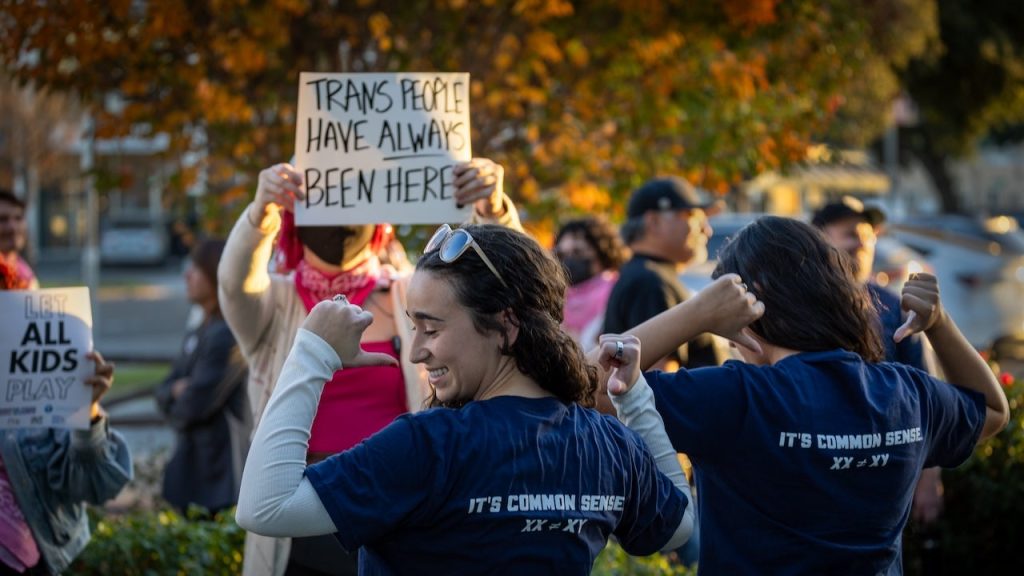The debate surrounding transgender athletes’ participation in women’s sports has intensified, capturing national attention and emerging as a pivotal political issue. A recent New York Times/Ipsos poll reveals a widespread sentiment among Americans, cutting across party lines, against allowing biological males who identify as female to compete in women’s sports. A striking 79% of respondents opposed the inclusion of transgender women in women’s sports, with even a majority of Democrats (67%) expressing disapproval. This resistance is even stronger among Republicans, with 94% voicing their opposition. Independents showed slightly less resistance, with 64% opposing inclusion and a notable 26% declining to answer, suggesting a degree of uncertainty within this group. This data underscores the significant public resistance to the inclusion of transgender women in women’s sports, transcending traditional political divides.
The heightened awareness and opposition surrounding this issue can be traced back to 2024, when several high-profile incidents brought the debate into the national spotlight. These incidents fueled controversy and polarized public opinion, ultimately transforming the issue into a key campaign talking point during the 2024 presidential election. President-elect Trump and other Republican candidates seized upon the issue, successfully leveraging it to resonate with a substantial portion of the electorate. An exit poll conducted by the Concerned Women for America (CWA) revealed the issue’s significant impact on moderate voters, with 70% expressing concern about Trump’s stance on transgender individuals’ participation in sports and use of restrooms. A significant 6% of these voters identified this as the most crucial issue, while 44% deemed it “very important,” underscoring the issue’s potency in influencing voter decisions.
The surge in public opposition is not a recent phenomenon. A Gallup poll conducted last year also found that nearly 70% of Americans opposed allowing biological males to compete in women’s sports. Similarly, a June survey by NORC at the University of Chicago revealed that 65% of respondents believed that transgender athletes should never or rarely be allowed to participate in sports leagues aligning with their gender identity, rather than their biological sex. When specifically asked about adult transgender women competing in women’s sports, opposition rose to 69%, solidifying the consistency of public opinion across multiple surveys. This consistent opposition reinforces the widespread concern regarding fairness and competitive balance in women’s sports.
The political landscape reflects this public sentiment. With President-elect Trump’s imminent return to office, Republicans are actively pursuing legislation to address the issue of transgender athletes’ participation in sports. The Protection of Women and Girls in Sports Act, recently passed by the House of Representatives with bipartisan support, aims to regulate this participation. The bill’s passage in the House signifies the gathering momentum behind legislative efforts to restrict transgender women’s involvement in women’s sports. The bill now proceeds to the Republican-controlled Senate, where its likely passage would pave the way for President Trump to sign it into law early in his term.
This legislative push mirrors the growing national discourse surrounding transgender rights and the evolving understanding of gender identity. The issue of transgender athletes in sports has become a focal point of a broader cultural clash, with traditional notions of sex and gender being challenged by evolving societal perspectives. This clash has manifested in heated debates about fairness, inclusion, and the biological differences between males and females. Advocates for inclusion argue that transgender women should have the right to compete in accordance with their gender identity, emphasizing the importance of recognizing and respecting transgender individuals’ experiences. Conversely, opponents raise concerns about competitive balance and the potential displacement of cisgender female athletes, arguing that biological differences create an unfair advantage for transgender women.
The issue has ignited a national counterculture, with both sides fiercely advocating for their respective positions. The debate has extended beyond the realm of sports, permeating discussions about gender identity in broader societal contexts, including education, healthcare, and legal recognition. This ongoing cultural battle highlights the complex interplay between individual rights, societal norms, and the search for equitable solutions in a rapidly changing world. As the legal and political landscape continues to evolve, the debate surrounding transgender athletes in sports remains a contentious and emotionally charged issue, with far-reaching implications for both the sporting world and society as a whole.

